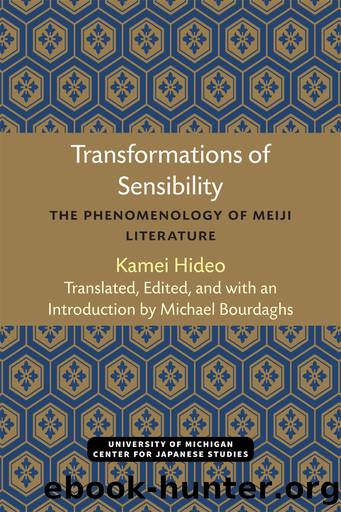Transformations of Sensibility: The Phenomenology of Meiji Literature by Kamei Hideo & Michael Bourdaghs

Author:Kamei Hideo & Michael Bourdaghs
Language: eng
Format: epub
Publisher: University of Michigan Center for Japanese Studies
Published: 2020-01-15T00:00:00+00:00
Chapter Seven
Shinjū as Misdeed: Love Suicides in Higuchi IchiyŠand Chikamatsu Monzaemon
TRANSLATED BY LEWIS HARRINGTON
In this chapter, Kamei traces through literary portrayals of suicide, from the passion-driven double suicides of Edo-period theater to the suicides of modern, alienated individuals in late Meiji fiction such as Shimazaki TÅsonâs Spring and Natsume SÅsekiâs Kokoro. Kamei argues that these novels arose out of a critical reaction to a wave of earlier fiction that narrated love suicides, including Higuchi IchiyÅâs âTroubled Watersâ and Hirotsu RyÅ«rÅâs The Love Suicides at Imado. In examining the âphilosophy of suicide â harbored by IchiyÅâs story, Kamei argues that the key lies in its mobilization of a second-person narrator. The flow of narration moves seamlessly between various characters â voices (especially since no punctuation is used to distinguish between speakers), weaving their distinct tones into the narration, yet also at the same time maintaining a distanced, effaced position. A dynamic tension between ground (narrative description) and figure (spoken dialogue) is maintained throughout, a technique whose origin Kamei traces to the Edo-period jÅrun puppet plays of Chikamatsu Monzaemon. Further ties to Edo-period theatrical genres are brought out through a comparison of IchiyÅâs appropriation of the different modes for relating body to voice that characterized jÅruri and kabuki. Kamei concludes that what emerges in IchiyÅâs heroine is an embodied sensibility that perceives itself as an offense against the social order, but that nonetheless commits itself wholly to that offense, finally to the point of self-destruction.
Most likely, Genshichi asked Oriki to die with him and Oriki was unable to refuse. At least, Higuchi IchiyÅâs âTroubled Watersâ (âNigorie,â 1895) is written in a manner to allow such a reading.1 As Maeda Ai has vividly analyzed, this is because in Orikiâs feeling of ostracization, as if she had been completely cut off from this world, there is certainly âalready the portent of a wretched death.â2
In the case of Hirotsu RyÅ«rÅâs The Love Suicides at Imado (Imado shinjÅ«, 1896), on the other hand, it is most likely the courtesan Yoshizato who proposes the double suicide.3 With the man she loves having returned to his hometown, Yoshizato lies crying in a room when Zenkichi enters. Zenkichi is a customer whom Yoshizato has repeatedly rejected. Zenkichi says he is visiting her for the last time; even if he wanted to, he will not be able to visit her again; and that being the case, he pleads, will she not be with him for just one night?4 Most likely Yoshizato intuits a certain resolve in Zenkichiâs words and allows him to stay in the brothel. She sells her clothes, borrows as much as money as she can from her friends in order to pay off Zenkichiâs bills, and finally throws herself into the Sumida River together with him.
What a truly miserable way to die!
Death is the only way for the man, Zenkichi, to transcend his oafishness. For the woman, however, the point is not that she loves this man, but rather that she is reduced to such dire
Download
This site does not store any files on its server. We only index and link to content provided by other sites. Please contact the content providers to delete copyright contents if any and email us, we'll remove relevant links or contents immediately.
The Power of Myth by Joseph Campbell & Bill Moyers(1057)
Half Moon Bay by Jonathan Kellerman & Jesse Kellerman(979)
Inseparable by Emma Donoghue(976)
A Social History of the Media by Peter Burke & Peter Burke(976)
The Nets of Modernism: Henry James, Virginia Woolf, James Joyce, and Sigmund Freud by Maud Ellmann(899)
The Spike by Mark Humphries;(809)
The Complete Correspondence 1928-1940 by Theodor W. Adorno & Walter Benjamin(783)
A Theory of Narrative Drawing by Simon Grennan(775)
Culture by Terry Eagleton(771)
Ideology by Eagleton Terry;(733)
World Philology by(712)
Farnsworth's Classical English Rhetoric by Ward Farnsworth(711)
Bodies from the Library 3 by Tony Medawar(707)
Game of Thrones and Philosophy by William Irwin(707)
High Albania by M. Edith Durham(699)
Adam Smith by Jonathan Conlin(687)
A Reader’s Companion to J. D. Salinger’s The Catcher in the Rye by Peter Beidler(686)
Comic Genius: Portraits of Funny People by(649)
Monkey King by Wu Cheng'en(647)
